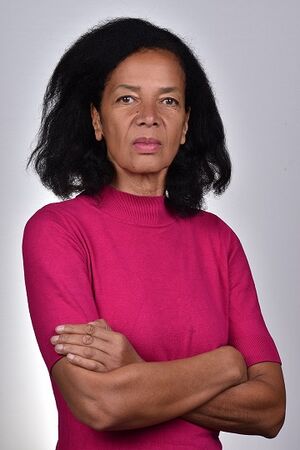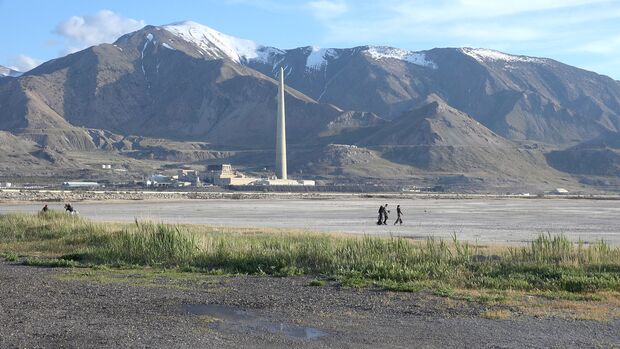Villa Aurora Events Archive
March 2023
Becoming Black - Film Screening and Discussion
Goethe-Institut Los Angeles

Information
About the Documentary BECOMING BLACK
A white couple in the GDR of the 1960s explains to their Black daughter that her skin color is pure coincidence and has no meaning. This is also what the girl likes to believe until, by chance, she discovers the truth at the age of 12.
The child is filmmaker Ines Johnson-Spain.
Long after meeting her biological father's family in Togo, she now, in the role of protagonist and author, reconstructs her family history in the film BECOMING BLACK.
In emotional and open conversations with her stepfather, the atmosphere of silence and repression gets impressively palpable. Slowly it becomes clear how the social environment allowed such a serious denial of facts. The private is political. While exploring her own identity, Ines Johnson-Spain unveils the big taboo that overshadowed her whole childhood, revealing the structural racism in the GDR. In connection with the touching meeting with her late-found Togolese family, the film reflects on identity, family concepts, and social norms. From the 1960s in East Berlin to the present, previously unwritten German history unfolds in this intimate and touching self-portrait.
Germany, 2019, 91 Minutes, digital projection. In German/French with English subtitles. Writer-Director: Ines Johnson-Spain, Director of Photography: Sebastian Winkels, Anne Misselwitz, Editor: Yana Höhnerbach, Executive Producers: Katrin Sandmann, Stefan Matthieu, Producer: Anahita Nazemi.
Production Company: Kobalt Documentary in co-production with Zweites Deutsches Fernsehen (ZDF) (Das kleine Fernsehspiel).
Participants

Ines Johnson-Spain, born and raised in the GDR (*1962), studied religious studies at the Free University of Berlin and liberal arts and film history as a guest at the Berlin University of the Arts. She works as a director and screenwriter. She is particularly interested in self-concepts in the field of tension between the individual and society. In the current film BECOMING BLACK she autobiographically dealt with her German/Togolese origin. She is currently a fellow at Villa Aurora.

Katarina Hedrén is a Swedish film programmer and film critic of Ethiopian origin, who has worked with film festivals worldwide, incl. The European Film Festival in South Africa, Film Africa (The UK), FESPACO (Burkina Faso), IDFA (The Netherlands) and Göteborg Film Festival (Sweden) among others. As a film critic she has contributed to various platforms, incl. Africa is a Country, BBC Culture, Sweden Radio, Radio 702 in South Africa and to the anthology Gaze Regimes – Films and Feminisms in Africa (Mistry & Schuhmann, Wits University Press, 2015). She regularly writes for the Swedish periodical, FLM.
Partners
An event in collaboration with our partner institution Thomas Mann House and the Goethe-Institut Los Angeles.

Artist Talk: Antje Majewski
Villa Aurora (520 Paseo Miramar, Pacific Palisades, CA 90272)

Information
In her project A Journey Reversed Antje Majewski retraced the route that a member of her family, also an artist, took in 1847-49 from Bremen via New York up the Platte River, Salt Lake City to Los Angeles. He was one of many travelers on the Gold Rush and like so many, he arrived in LA in rags and sick, and most likely died soon after. With four letters that he had sent to the family, Majewski traces her ancestor's path and closely engages with the changes in the landscapes that this massive migration and taking of land, the industrialized agriculture and the extraction of fossil energies have caused.
In a separate project, The Osage Orange, Majewski looks at a tree native to Oklahoma, the Osage Orange Tree. She reflects on the different cultural practices the tree is used for and engages with issues of displacement and changes of lifestyle in her work.
About The Artist

Antje Majewski’s practice comprises paintings, video works, texts and performances that deploy an approach based on anthropological and philosophical questions. Her most recent works are centered around questioning objects, territories and plants, and focus on research surrounding alternate systems of knowledge, storytelling and the potential of transformative processes with a particular interest in cultural and geobotanical migration. An integral part of Majewski’s process is her recurring collaboration with other artists, ecological groups and urbanism-focused collectives.
Works by Antje Majewski have been shown in a number of international exhibitions including those at Kunsthaus Graz (2019), Gropius Bau, Berlin (2019); Hamburger Bahnhof – Museum für Gegenwart, Berlin (2018); CCA Tel Aviv (2016); Ujazdowski Castle Centre for Contemporary Art, Warsaw (2016); Museum Abteiberg, Mönchengladbach (2015); Muzeum Sztuki, Lodz (2014); Deutsche Bank Kunsthalle, Berlin (2013); Frankfurter Kunstverein, Frankfurt am Main (2013); Heidelberger Kunstverein, Heidelberg (2013); Villa Romana, Florenz (2012); Weltkulturen Museum, Frankfurt am Main (2012); Kunsthaus Graz, Graz (2011) and Salzburger Kunstverein, Salzburg (2008).
Antje Majewski studied art history, history and philosophy in Cologne, Berlin and Florence, and has been a professor of painting at Muthesius University of Fine Arts and Design in Kiel since 2011. She lives and works in Berlin and Himmelpfort (DE).




